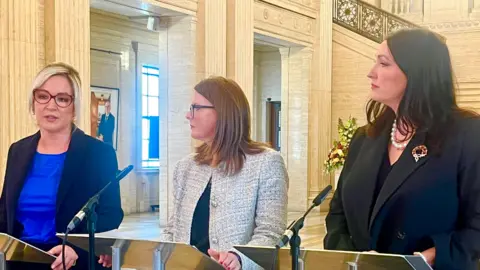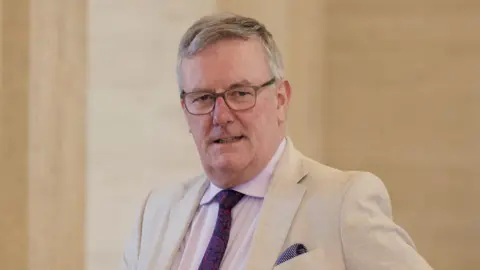By John Campbell, BBC News NI economics and business editor
 BBC
BBCThe Department of Health is to get an extra £122m as part of a Stormont mini budget.
More than £300m of mostly new money from Westminster has been allocated to Stormont departments – including health, education and social housing – in what is known as a monitoring round.
Monitoring rounds provide a system to review spending plans and are usually held three times a year, in January, June and October.
The mini budget includes funds which were unspent at the end of the last financial year and new money which flows from Westminster spending decisions.
Education gets an additional £88m, about half of which will be used to settle a long-running pay dispute with classrooms assistants and other non-teaching staff.
‘Difficult situation’
The Finance Minister, Caoimhe Archibald, said there was “quite simply not enough funding available to do all the things we would wish to do” but the extra money will “help to mitigate the worst impacts” of Stormont’s current budget position.
Speaking at a press conference at Stormont on Monday, the Northern Ireland Deputy First Minister, Emma Little-Pengelly, said “no minister will have got everything that they would have asked for”.
However, she added: “We recognise that is because it is a difficult fiscal situation that we are in”.
Ms Little-Pengelly said the executive is “determined to fix our health service, tackle waiting lists, ensure that our education system works for everyone, get the investment where it needs to go”.
She said that to do that, the executive needs to “secure additional investment while making sure that we allocate the current funding that we have available in the right places”.
“I believe that is what we have done this morning,” she said.
The opposition SDLP is to write to the head of the NI Civil Service to question the timing just three days before an election.
Ms Archibald said she had considered the pre-election issue but took the view that the process “represents normal and routine business of the executive”.
“There is also an urgent need to provide funding certainty to departments and even a short delay presents risks,” she added.
Health service
The funding of the NI health service has been a source of major political controversy with the Ulster Unionist health minister voting against April’s Stormont budget.
The then minister, Robin Swann, said the health budget was being effectively cut and means “people will be at increased risk of harm”.
The additional £122m is still less than the Department of Health says it needs to avoid damaging cuts to services.
The Department of Health’s budget includes an assumption that it would get at least £50m in the monitoring round while the health trusts say they will need an additional £190m.
That would still leave the health budget about £150m short before the potential impacts of new pay settlements are included.
Other major allocations in the monitoring round include £35m for general pressures in the Department of Justice and £20m to the Department of Communities for social housing.
 PA Media
PA MediaWhat does this new money mean?
by Marie-Louise Connolly, BBC News NI health correspondent
The big black financial hole in health and social care has been filled in a little bit – but not nearly enough, according to the Department of Health.
From Monday, health has an additional £122m at its disposal in addition to the £7.8bn it received in the overall budget.
There was also £34m allocated to waiting lists in May – a long way off from the £215m that Robin Swann said was required.
These figures do not address what’s required to cover pay deals next year, which is approximately an additional £200m.
Despite the money, some services will still be cut – some less “catastrophic” than others.
We can expect to see fewer domiciliary care packages and hospital beds, and cuts to the number of operating lists.
While there is little wriggle room at the moment for services and staff, there’ll be even less in the future.
Health inequalities are already evident in communities across Northern Ireland and this will make a bad situation even worse.
Critics have argued that the health department needs to produce plans with targets.
Health Minister Mike Nesbitt will need to start prioritising and imaginatively thinking outside the box.





